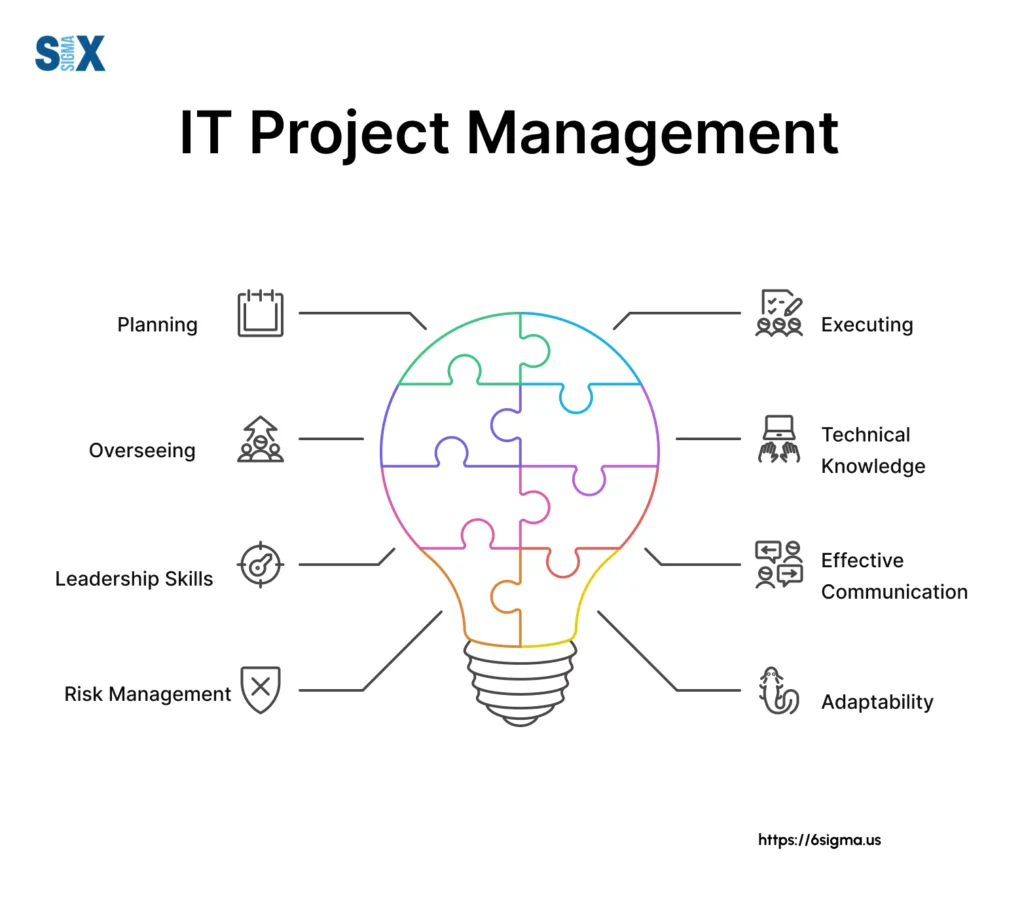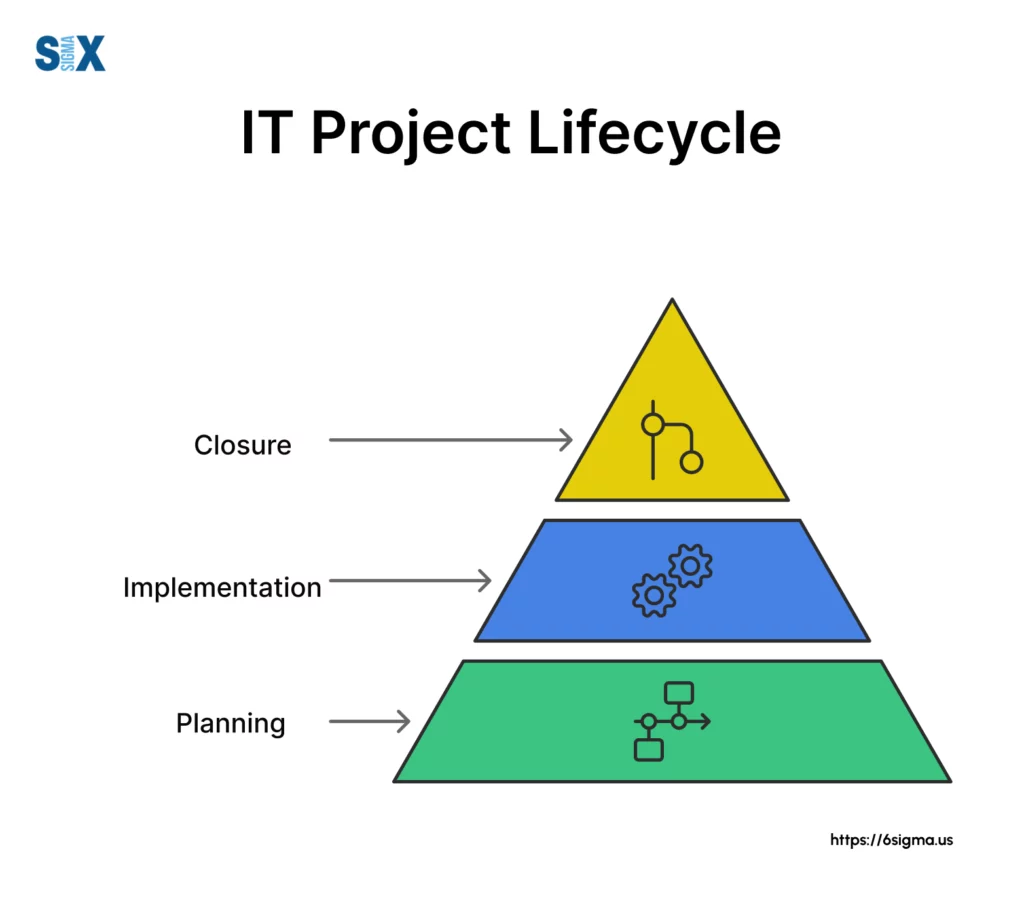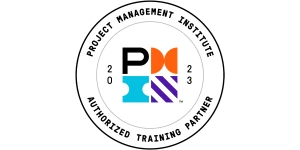IT Project Management: Everything You Need to Know
IT project management has become a critical discipline for organizations striving to stay competitive and innovative.
It encompasses the planning, execution, and oversight of projects within the information technology sector, combining traditional project management principles with the unique challenges of the IT industry.
From software development to infrastructure upgrades, it ensures that complex technological initiatives are delivered on time, within budget, and to the satisfaction of stakeholders.
Key Highlights
- Defining IT project management and its importance
- Exploring key phases of IT project lifecycle
- Comparing Waterfall and Agile methodologies
- Essential tools: Gantt charts and Kanban boards
- Addressing challenges: scope creep and distributed teams
- Best practices for successful IT project management
Introduction to IT Project Management
IT project management is a complex field that requires a deep understanding of both technology and business processes.
Defining IT Project Management
IT project management is the process of planning, executing, and overseeing projects specific to information technology.
Drawing from my experience working with companies like 3M and Dell, I’ve seen firsthand how IT project management involves a unique blend of technical expertise and traditional project management skills.
It encompasses everything from software development and network upgrades to database implementations and cybersecurity initiatives.

The Importance of IT Project Management in Modern Organizations
In today’s digital age, effective IT project management is crucial for organizational success.
It ensures that technology initiatives align with business objectives, optimizes resource allocation, and mitigates risks associated with complex IT projects.
From my work with industry leaders like Intel and HP, I’ve observed how robust IT project management can drive innovation, improve operational efficiency, and provide a competitive edge in the marketplace.
Introduction to IT project management concepts with Lean Six Sigma Yellow Belt
Key Phases of IT Project Management
Understanding the lifecycle of an IT project is essential for successful management.
These are the key phases that I’ve implemented countless times in my career.

Project Initiation and Planning
The initiation phase involves defining the project’s scope, objectives, and deliverables. During planning, we create a detailed roadmap, allocate resources, and establish timelines.
In my experience leading Six Sigma deployments, I’ve found that thorough planning is crucial for setting the stage for project success.
Execution and Monitoring
This phase involves implementing the project plan, managing team members, and tracking progress.
Utilizing techniques from statistical process control, we continuously monitor key performance indicators to ensure the project stays on track.
Regular status updates and stakeholder communications are vital during this phase.
Project Closure and Lessons Learned
Upon project completion, we conduct a thorough review to assess successes and areas for improvement. This phase is critical for organizational learning and continuous improvement.
As a Master Black Belt, I always emphasize the importance of documenting lessons learned to enhance future project performance.
Detailed explanation of project lifecycle phases with Lean Six Sigma Green Belt
IT Project Management Methodologies
Choosing the right methodology is crucial for project success. Let’s explore the most common approaches I’ve implemented throughout my career.
Waterfall vs. Agile Approaches
The Waterfall methodology follows a linear, sequential approach, while Agile embraces iterative development and flexibility.
In my work with companies like Motorola and Xerox, I’ve seen how each methodology can be effective depending on the project’s nature and organizational culture.
Hybrid Methodologies for IT Projects
Hybrid methodologies combine elements of both Waterfall and Agile approaches. These flexible frameworks can be particularly effective for complex IT projects.
In my experience developing Six Sigma deployment strategies, I’ve often found that a tailored, hybrid approach can yield the best results.
Essential Tools and Techniques in IT Project Management
Leveraging the right tools and techniques is crucial. Let’s explore some of the most powerful ones I’ve utilized throughout my career.
Gantt Charts and Kanban Boards
Gantt charts provide a visual representation of project timelines and dependencies, while Kanban boards help manage workflow and identify bottlenecks.
In my workshops on Business Process Charting, I often demonstrate how these tools can significantly enhance project visibility and team productivity.
Risk Assessment and Management Strategies
Effective risk management is crucial in IT projects. Techniques like FMEA (Failure Mode and Effects Analysis) and Monte Carlo simulations can help identify and mitigate potential risks.
My background in statistical analysis has proven invaluable in developing robust risk management strategies for various IT initiatives.
Challenges in IT Project Management
IT project management comes with its unique set of challenges. Let’s discuss some common obstacles and strategies to overcome them.
Scope Creep and Budget Management
Scope creep can derail even the most well-planned IT projects.
Implementing rigorous change control processes and maintaining clear communication with stakeholders are essential strategies I’ve used to combat this issue.
Balancing Technical Requirements with Business Objectives
IT projects must align with broader business goals while meeting technical specifications.
My experience in applying Six Sigma methodologies to business processes has been instrumental in bridging this gap and ensuring IT initiatives deliver tangible business value.
Managing Distributed Teams and Evolving Technologies
With the rise of remote work and rapidly evolving tech landscapes, managing distributed teams and staying current with technologies is crucial.
Leveraging collaboration tools and fostering a culture of continuous learning are strategies I’ve successfully implemented in international projects.
Know all the common IT project management obstacles for your business with Lean Six Sigma Black Belt
Best Practices for Successful IT Project Management
Drawing from my extensive experience, here are some best practices that can significantly enhance IT project management success.
Implementing Robust Project Management Software
Utilizing comprehensive PM software can streamline processes, enhance collaboration, and provide real-time insights.
In my consulting work, I’ve seen how the right software can transform project management effectiveness.
Effective Stakeholder Communication
Clear, consistent communication is the backbone of successful IT project management.
Developing a solid communication plan and leveraging data visualization techniques can greatly enhance stakeholder engagement and project transparency.
Continuous Learning and Skill Development
The IT landscape is ever-evolving, making continuous learning crucial.
Encouraging certifications, attending workshops, and fostering a culture of knowledge sharing are practices I’ve championed throughout my career to keep teams at the cutting edge.
The Future of IT Project Management
As we look ahead, it’s clear that IT project management will continue to grow and adapt to new challenges and opportunities.
Emerging Trends and Technologies
Artificial Intelligence, Machine Learning, and advanced analytics are set to revolutionize IT project management.
These technologies promise to enhance predictive capabilities, automate routine tasks, and provide deeper insights into project performance.
The Evolving Role of IT Project Managers
The role of IT project managers is expanding beyond traditional boundaries.
Future IT project managers will need to be strategic thinkers, technology visionaries, and change management experts.
As someone who has witnessed the field’s evolution over two decades, I’m excited about the opportunities and challenges that lie ahead for IT project management professionals.
SixSigma.us offers both Live Virtual classes as well as Online Self-Paced training. Most option includes access to the same great Master Black Belt instructors that teach our World Class in-person sessions. Sign-up today!
Virtual Classroom Training Programs Self-Paced Online Training Programs







